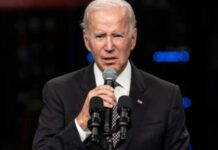
The Islamic Revolution of 1979 celebrated their 45th anniversary on February 11th in Tehran. Thousands of Iranians joined in on parades throughout Tehran and millions throughout the nation. American and Israeli flags burned as chants of “Death to America” and “Death to Israel” peppered the air, with multiple Tehran marches meeting up in Azadi Square. A common practice for their parades and marches, state television showcased the day’s events.
Much like North Korea, the Iranian military paraded out their Qassem Soleimani and Sejjil ballistic missiles. Set up in the square with the Simorgh satellite carrier and drones, people were highly encouraged to take selfies and showcase the weaponry. Carrying a Palestinian flag, a skydiver parachuted into the Square in Tehran as well. Cloaked by other high-ranking officials, hardline President Ebrahim Raisi addressed the crowds, condemning Israel and strikes in Gaza.
Islamic Revolutionary Guard Corps General Mohammad Salami and Gen. Esmail Ghaani, the head of the expeditionary force of Iran’s paramilitary Revolutionary Guard, were also paraded around in Tehran. Head of the Judiciary body, Gholamhossein Mohseni Ejehi, surprised people by attending a rally in the central city of Isfahan.
Given the various Iranian-backed groups conducting attacks around the Middle East in recent months, security was beefed up exponentially.
Originally starting in 1979, the Islamic Revolution began over the rule of Shah Mohammad Reza Pahlavi. Terminally ill with cancer, he fled in January 1979, and Ayatollah Ruhollah Khomeini emerged from exile. Much like the fabled woodchuck in Pennsylvania, he saw his shadow, and since then, the nation has seen no peace or freedom. In less than 60 days following the Shah’s departure, the Ayatollah and his supporters toppled the government and its remaining security forces.
Within a year of the re-establishment of Iran, they found themselves in conflict with Sadaam Hussein. Lashing out in fear of Iran’s potential to influence the Shia majority of Iraq, he embarked on an eight-year battle. Soon establishing a goal of taking a seat toward the head of the table in the Middle East, Iraq was firmly entrenched in the idea of conflict with Iran.
They accepted the terms of the United Nations Security Council Resolution 598, which set the conflict to an end. However, it was just the beginning of their reign of terror.
In 2008, Daniel Byman explained, “Iran’s use of terrorism has changed dramatically since the 1980s. Most importantly, from a U.S. point of view, Iran appears not to target Americans directly, although it still retains the capability to do so, and in Iraq, some groups with links to Iran have fought with coalition forces. Iran instead uses terrorism as a form of deterrence, “casing” U.S. embassies and other facilities to give it a response should the United States step up pressure. Tehran also dramatically cut back on operations in Europe and the Gulf states since the early 1990s.”
Since then, Hezbollah from Lebanon has received some of the closest and most prolific support from Iran. Widely considered to be the closest relationship between a nation and a terrorist organization in history, they have been founded, organized, funded, and trained by Iran. Doing this with minimal hands-on activity, they quickly became independent and often acted in Iran’s interest above all else.
Various groups in Palestine have been funded by Iran, with most of them focused on causing trouble with Israel. From Gaza to the West Bank, they strike the people and government of Israel and assist other terrorist organizations in their attacks. Going frequently through Hezbollah, they are kept at more than arm’s length but also do more of the “dirty” work.
The Houthis have gotten more support as of late. With their current mission to attack Israeli and other ships in the Red Sea, they have taken to heavily relying on Iran for funding and a steady supply of weaponry. Being strongly tied with a strike that killed three soldiers in Jordan back in January, they have taken some of the most direct US-guided and lead action in the last four years.
With 45 years of persistent war crimes, it seems to be their founding member status in the United Nations, and as a member of OPEC, they have considerable government influence. They surprisingly have diplomatic relations with nearly 100 nations, and now are finding themselves entrenched in too many conflicts. Painting themselves as a target for future attacks from the US, UK, and our allies, they could be looking at another revolution much sooner than later.















